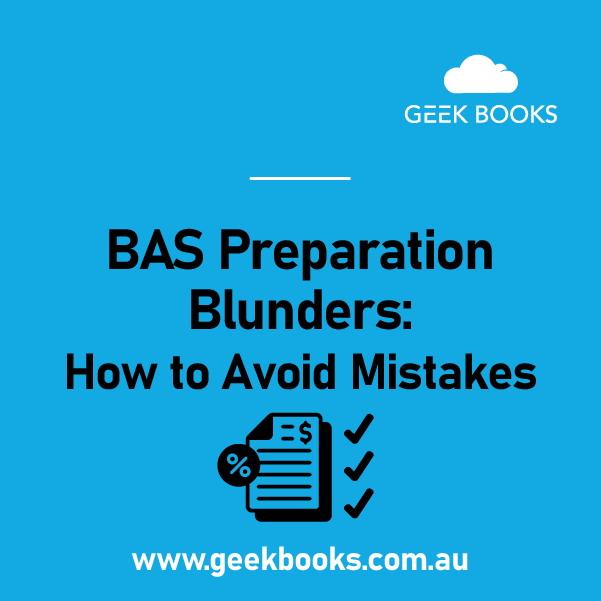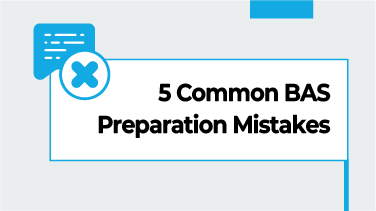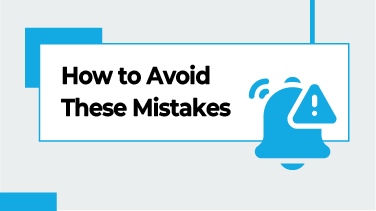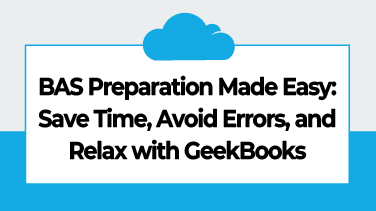Do you feel like you’re constantly chasing your tail with business paperwork?
You’re not alone. One of the trickiest tasks for many business owners is getting their BAS (Business Activity Statement) right. But what is a BAS, and why is it so important?
A BAS is a form businesses submit to the ATO to report and pay their tax obligations, including GST, PAYG withholding, and fringe benefits tax, to stay on the ATO’s good side.
On the other hand, making mistakes on a BAS can lead to costly penalties, wasted time fixing errors, and unnecessary stress.
Read on to discover how to avoid common BAS preparation mistakes and make BAS reporting easier.
5 Common BAS Preparation Mistakes
| Errors | Effects |
| Categorisation errors | Incorrect GST reporting and potential fines. |
| Calculation errors | Inaccurate tax payments, risking penalties and audits. |
| Claiming errors | Incorrect tax refunds or liabilities, incurring fines and correction costs. |
| Timing errors | Late fees and interest charges. |
| Record-keeping errors | Inaccurate reporting and rejected claims, leading to potential compliance issues and audits. |
Let’s take a closer look.
1. Categorisation Errors
- Mixing up GST-free and taxable sales. For example, basic food items, certain health services, and exports are generally GST-free, while most other goods and services you sell or purchase for your business are taxable and include GST.
- Incorrectly classifying expenses. Some expenses may include GST, while others do not.
- Overlooking capital purchases. Large purchases, like equipment or vehicles, must be properly accounted for in your BAS.
- Mixing business and personal expenses.
2. Calculation Errors
-
- Mathematical mistakes in adding up figures.
- Incorrectly inputting money figures. Enter whole dollar amounts; leave out cents, and don’t round up.
- Applying the incorrect GST rate on sales and purchases.
- Relying solely on automated software. While accounting/bookkeeping software is helpful, it’s not foolproof. Always review the figures and calculations your software generates to catch any errors.
3. Claiming Errors
- Claiming GST credits on personal expenses.
- Claiming ineligible deductions. Only certain business expenses, such as business-related travel, office supplies, and marketing costs, are eligible for deductions.
- Overstating GST credits.
4. Timing Errors
- Missing BAS lodgement due dates.
- Reporting income or expenses in the wrong tax period.
- Not adjusting for changes in reporting frequency. If your business grows, you must change your reporting frequency (e.g., from quarterly to monthly).
5. Record-Keeping Errors
- Failing to keep adequate records to support claims.
- Misplacing or losing invoices and receipts.
- Not reconciling bank statements with BAS figures.
How to Avoid These Mistakes
- Get organised: Use spreadsheets or software to track income and expenses and store invoices, receipts, and bank statements. Having all your financial documents in one place makes accessing and organising business transactions to support BAS claims easier.
- Use reliable bookkeeping software: Software like Xero and MYOB automate many BAS tasks and reduce the risk of manual errors.
- Separate business and personal expenses: Use dedicated bank accounts and credit cards for business transactions to avoid misclassification.
- Understand GST: Learn the difference between GST-free and taxable supplies, and know which expenses you can claim GST credits on. For example, basic food items and some health services are GST-free, while most goods and services you purchase for your business will include GST.
- Reconcile regularly: Reconcile your bank accounts with your BAS figures at least monthly to catch any discrepancies.
- Double-check everything: Review your BAS carefully before lodging it. Use a calculator to verify all calculations.
- Set reminders: Avoid missing lodgment due dates by setting reminders in your calendar or phone.
- Get professional help: Consult a professional accountant or BAS agent for help preparing and lodging your BAS on time in compliance with the ATO’s regulations.
- Stay updated: Subscribe to ATO updates and consult your accountant or BAS agent regularly to stay updated with GST, BAS, and tax law changes.
BAS Preparation Made Easy: Save Time, Avoid Errors, and Relax with GeekBooks
To err is human, but unfortunately, BAS mistakes can be expensive, stressful, and time-consuming to fix!
Avoid the headache of BAS mistakes by enlisting the help of GeekBooks.
As registered BAS agents, we’ll handle your BAS preparation, tax calculations, BAS form formatting and submission, and liaise with the ATO if necessary.
Complete our online booking form today or call us on 02 9158 3591.
FAQs
What is required for BAS?
For BAS, you must report GST collected and paid, PAYG withholding, PAYG instalments, and other taxes like fringe benefits tax and fuel tax credits with supporting documentation: invoices, receipts, and bank statements.
Can I do my BAS myself?
You can do your BAS yourself if you feel confident reporting your tax obligations correctly.
However, many business owners use accounting software or consult an accountant or BAS agent for accuracy and compliance.
Is BAS hard to do?
BAS can be challenging due to the need for meticulous record-keeping and a thorough understanding of tax obligations.
But with the right tools, such as accounting software and professional assistance, your BAS can be managed effectively.






